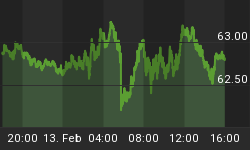The month of July has seen the most intense demand for physical gold and silver since April of 2013, setting numerous records for the year. On the heels of the spectacular drop in spot prices, buyers of physical metal have come out in droves. In fact, available supply is hardly able to keep up with the demand for immediate delivery of metals.
This betrays a fundamental reality about the market for physical gold and silver bullion that many investors - even regular buyers of bullion - are not aware of. There simply is not much supply available at any given time. In other words, gold and silver products spend very little time sitting on the shelf waiting to get bought, making inventory very tight. As such, in times of intense demand, the entire available supply can be bought up in a matter of weeks, or even days. This results in higher product premiums and extended shipping times.
This is exactly where the market is for physical metals is right now. Consider what has happened in just the last couple of weeks.
Major Mints Are Now on Allocation for Products
When a major mint like the United States Mint or the Royal Canadian Mint (RCM) goes on allocation, they are limiting the amount of product authorized purchasers can buy and when they can buy it. Simply stated, it means there is less available supply until the Mint ceases its allocation or increases it. This translates into extended shipping timelines for allocated products. Large dealers are still able to lock in orders for clients, but the product will not ship until that allocation from the issuing mint first arrives at their vault.
The US Mint suspended Silver Eagles sales for three weeks in July. When production resumed earlier this week, the Mint sold more than 2.5 million Silver Eagles in two days. The Mint now reports more than 5.3 million sold in all of July. With two days left in the month, this figure could end up topping January's sales of 5.5 million. The Mint is now allocating product with regular shipments.
Even bigger news is that the RCM has gone on allocation for silver and gold. While silver products have been on allocation several times in recent years, the last time gold products were on allocation from a major national mint was during the 2007-2008 financial crisis. During that time, investors had to wait a month or more before receiving product. (Silver shipments took much longer, averaging around two to three months or more.) These are roughly the same dynamics we are witnessing currently from the RCM. For the first time in over eight years, investors who want to buy a highly marketable gold product - the Gold Canadian Maple Leaf - may have to wait a month or more to receive it. The importance of this event should not go overlooked.
Significant Rise in Product Premiums
Strong demand for physical metals also results in higher premiums on popular products, such as nationally minted coins. Typically, products that are most backordered and delayed are also the products selling at a much higher premium. This has been the case nearly every single time major mints have gone on allocation. It's similar to a spike in gasoline prices at the pump when a hurricane or natural disaster disrupts the supply of fuel. The charts below demonstrate this reality with respect to two popular silver products, the 1-ounce Silver Eagle and 90% "junk" silver.

The premium on Silver Eagles is now as high as it was when silver made its multiyear low last November.

90% junk silver is particularly sensitive to premium increases, since it is no longer produced.
Conclusion: Caveat Emptor
The most important take away from all this is that it really doesn't take much extra demand to wipe out the "on the shelf" supply of physical precious metals.
Keep in mind that a large percentage of physical metal buyers have no intentions to sell. This means that during the next big wave of demand, there will be that much less available metal to market. Read our recently released special report, Why Buy Gold Now?, to learn more about this market undercurrent.
Remember - this surge in demand can come whether the price moves up or down in dollar terms. It was a $48 move downward in the price of gold that triggered the extra demand this month. If the move is $98 upwards, the same thing could occur as investors scramble to get in on the ground level of a new bull market. In fact, such a surge in price could be even worse for the supply picture, as people may begin to wake up to the inherent problems of our current monetary system.
















